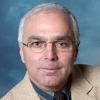
Jesuit Fr. Daniel Berrigan, in an undated photo. (CNS)
The best way to remember those who have been killed in battle is to work for the day when others will no longer be sent to take their place.
Prayerfully reflecting on how to move away from war and war preparation should be central to every Memorial Day.
Why do presidents and Congresses send young men and women to kill and be killed? Why do most Americans so easily accept their worn-out, immoral answers? And why can't we finally learn how to wage peace, instead of war?
Some time ago, while reflecting on these very questions, I turned for insight to America's preeminent Catholic anti-war veteran, the recently deceased Jesuit Fr. Daniel Berrigan.
When I talked with him, the soft-spoken Berrigan, then in his upper 80s, told me he was still writing, giving retreats and getting arrested for anti-war civil disobedience. Fr. Berrigan said as a young Jesuit he met and worked with two giant Catholic figures of the 20th century -- Dorothy Day and Trappist monk Thomas Merton. Their deep spiritual and uncompromising commitment to nonviolence had a lasting effect upon his life.
His late brother Philip also deeply influenced him. They were truly kindred spirits. After all, they were known as the "Berrigan brothers."
Fr. Berrigan said in the mid-1960s Cardinal Francis Spellman, then archbishop of New York, strongly supported American involvement in the Vietnam War. The cardinal said the Vietnam War was a just war. The Berrigans said, "No war is just."
Daniel Berrigan added, "I don't know how we can open the Gospel and wage war."
While Spellman was flying to Vietnam aboard a U.S. bomber, Berrigan told me he and his brother Phillip were protesting in front of New York's St. Patrick's Cathedral holding a banner that read "Thou Shall Not Bomb."
As people passed by they handed out anti-war leaflets stained with their own blood. "It's better to give blood than to take it," he added.
One of Berrigan's most symbolic acts of civil disobedience -- which landed him in prison -- was when he and eight other protesters used napalm to burn paper draft records in Catonsville, Md. He said they used napalm to highlight the fact that American warplanes were dropping napalm bombs on countless Vietnamese civilians.
Berrigan explained that napalm is made out of kerosene and soap chips. The soap chips allow burning kerosene to adhere to human skin. He said, "It's criminal to burn paper, but not criminal to burn children.
"What do we make of the Sermon on the Mount while all this is going on," questioned Fr. Berrigan. "Jesus lived by nonviolence, he commanded us to love our enemies.”
Berrigan not only fiercely opposed the violence of war, but consistently opposed all forms of violence. Having protested at abortion centers, he said, "A decent society should no more have an abortion clinic than the Pentagon."
Berrigan contrasted the flag-flying militaristic "patriotism" that shapes much of Memorial Day, to that of Gospel nonviolence with these words: "Are we Christians who happen to be American? Or are we Americans who happen to be Christian?"
The very fate of the nation, not to mention our souls, hinges on our answer.
May the peacemaker Fr. Daniel Berrigan, rest in eternal peace with the God of peace.
And through his intercession, may all who proclaim to be disciples of the Prince of Peace, sincerely pray and sacrificially work to build up the peaceable Kingdom of God on earth, as it is in heaven.
[Tony Magliano is an internationally syndicated social justice and peace columnist. He is available to speak at diocesan or parish gatherings about Catholic social teaching. His keynote address, "Advancing the Kingdom of God in the 21st Century," has been well-received by diocesan gatherings from San Clemente, Calif., to Baltimore. His email address is tmag@zoominternet.net.]
Editor's note: We can send you an email alert every time Tony Magliano's column, "Making a Difference," is posted. Go to this page and follow directions: Email alert sign-up.

